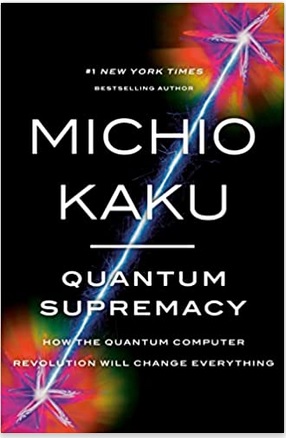I have just finished reading Quantum Supremacy: How the Quantum Computer Revolution Will Change Everything, by Michio Kaku, professor of theoretical physics here at the City University of New York. It covers a lot of ground in reviewing the development of quantum computers and predicting their contributions in helping to advance major developments in humankind’s evolution especially in science and medicine. The first part of the book referring to the work of Alan Turing, Albert Einstein, Max Planck and Niels Bohr is well done and accessible. However, the evolution of quantum computers based on the nature of qubits versus the nature of simpler digital bits is not easy material. The second part of the book focuses on the potential impact of quantum computers for solving and helping us understand major universal phenomena. As with most predictions in technological evolution and prediction, it is not a question of whether but of when. In this respect, Kaku joins many others who have ventured into this realm. Below is a brief review that appeared in the audio book section of the New York Times Book Review.
Try it if you have an interest in the quantum world.
Tony
—————————————-
The New York Times Book Review
Audiobooks
From Subatomic Particles to the Cosmos, and Every Bird in Between
Sebastian Modak
May 26, 2023
If you’d asked me a month ago what quantum theory was, I would have tried to answer only to stop myself once I realized that I didn’t actually know. It’s one of those concepts, like space-time or artificial intelligence, that many of us recognize (from science fiction, from the news) without ever really understanding them. That’s where QUANTUM SUPREMACY: How the Quantum Computer Revolution Will Change Everything (Random House Audio, 10 hours, 41 minutes), by the renowned translator of theoretical physics Michio Kaku, comes in. Named for the theoretical stage at which “a radically new type of computer, called a quantum computer, could decisively outperform an ordinary digital supercomputer on specific tasks,” the audiobook, read with deliberate — if at times robotic — clarity by Feodor Chin, begins with claims, by a handful of companies, that we are already there.
Kaku explains how we’ve come to such an “inflection point,” at which the potential benefits of quantum computing — that is, computing at the subatomic level, without the need for microchips — are increasingly outweighing the risks, like the need for extremely controlled conditions. Kaku spends much of the audiobook recounting the history of computing, bringing listeners back to the Turing machine and the invention of transistors as crucial foundations.
That mind-blowing future is the focus of the final five or so hours of the audiobook, which explores the real-world impacts quantum computing could have: altering our immune systems to avoid cancer and Alzheimer’s, increasing crop yields, ending world hunger. As Kaku puts it, “the familiar laws of common sense are routinely violated at the atomic level”; but his lucid prose and thought process make abundant sense of this technological turning point.



